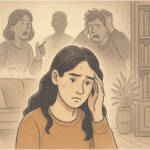Key Takeaways
- Don’t say things like “It’s all in your head” or “You’re just overreacting” because they can make people with schizoaffective disorder feel unimportant and like you don’t care.
- Saying things like “It could be worse” makes people less likely to get help and makes their problem seem less serious.
- One should not compare mental health challenges of other people with a person suffering from schizoaffective disorder.
- Empathy and support are crucial in communication, with phrases like “I care about what you’re going through” helping to make individuals feel valued and heard.
- A Mission for Michael (AMFM) offers comprehensive treatments for schizoaffective disorder by combining evidence-based therapies with personalized care to effectively manage both psychotic and mood-related symptoms.
Understanding Schizoaffective Disorder
Schizoaffective disorder is a mental health condition that merges symptoms of schizophrenia, like hallucinations and delusions, with mood disorder elements such as depression or mania. It’s important to understand the complexity of these symptoms to provide effective support.
People with schizoaffective disorder can experience a range of symptoms that may change in intensity:
- Psychotic Symptoms: Delusions, hallucinations, and disorganized thinking can lead to significant distress and confusion.
- Mood Disturbances: Episodes of severe depression or mania complicate daily functioning and social interactions.
Founded in 2010, A Mission For Michael (AMFM) offers specialized mental health care across California, Minnesota, and Virginia. Our accredited facilities provide residential and outpatient programs, utilizing evidence-based therapies such as CBT, DBT, and EMDR.
Our dedicated team of licensed professionals ensures every client receives the best care possible, supported by accreditation from The Joint Commission. We are committed to safety and personalized treatment plans.
Differences from Other Mental Health Disorders
Schizoaffective disorder is a unique mental health condition that mixes features of schizophrenia with those of mood disorders. This mental health illness is mainly defined by the presence of delusions (false beliefs) and hallucinations (seeing or hearing things that are not there). However, schizoaffective disorder can also cause mood symptoms, which makes it harder to diagnose and treat.
Because of how complex schizoaffective disorder is, treatment usually needs to be done in a lot of different ways. This usually includes a mix of antipsychotics, mood stabilizers, and antidepressants to effectively treat the wide range of symptoms associated with the condition.
Importance of Patience and Understanding
Supporting someone with schizoaffective disorder requires patience and understanding. Being able to adapt to the fluctuations in their symptoms and daily capabilities is also important. Letting them talk about how they’re feeling and what’s going on in their lives and being there for them without any judgement helps tremendously.
Phrases to Avoid with Someone with Schizoaffective Disorder
Don’t Ignore Personal Experiences
Try not to dismiss someone’s feelings with things like “it’s all in your head” or “you’re just overreacting.” That can make someone feel invalidated and ignored. It’s better to just acknowledge and validate their feelings.
Minimizing Their Symptoms
Everyone’s experience things in different ways, especially someone who suffers from schizoaffective disorder. So, it’s important to not make their experiences worthless compared to others. Sentences like “It could be worse” or “At least it’s not something more serious” shouldn’t be spoken to someone suffering from schizoaffective disorder.
Don’t Compare Mental Health Challenges
Mental health conditions can vary a lot from person to person, so it’s not really helpful to compare them. Saying things like “Everyone gets sad sometimes” or “We all have our problems” makes the challenges faced by someone with schizoaffective disorder seem trivial.
You should focus, instead, on understanding the person by asking open-ended questions such as, “Can you elaborate on the situation you are facing?” to show that you’re trying to help them.
Communicating in a Better Way

Show You Care and Are There for Them
If you’re talking to someone with schizoaffective disorder, it’s really important to be empathetic. Showing that you understand and care about what they’re going through can make them feel valued and listened to. Saying things like “I care about what you’re going through” or “I’m here for you if you need to talk” can show you care. Also, actions speak volumes.
Pay Attention and Don’t Stop Listening
Practice actively listening when speaking with someone who has schizoaffective disorder. Focus fully on the speaker and refrain from immediately giving your responses or interrupting.
Also maintain eye contact while listening and nod to the speaker while they’re talking to indicate that you understand. Additionally, using phrases such as “I see” or “Tell me more” can convey empathy and maintain engagement.
This way, you’ll create a respectful and validating communication environment.
Positive Language and Encouragement

By implementing positive language in conversations, it gives them the confidence they need and makes them feel like they have achieved something. Small things like saying “I believe in you” or “You’re doing great” can really boost their energy and make them feel better as these words have the power to encourage them.
Celebrate small victories as even the smallest of achievements has the ability and power to make them feel more motivated and at the same time, show their progress.
The Importance of Using Language That Encourages Recovery
Hopeful language is key to recovery because it reassures people and makes them feel hopeful about the future. It encourages people with schizoaffective disorder to look beyond their immediate challenges and envision a brighter future.
Why Choose A Mission for Michael for Your Schizoaffective Disorder Treatment?

At A Mission for Michael (AMFM), we specialize in tailored treatments for schizoaffective disorder at our centers in California, Virginia, and Washington. Our personalized treatment plans address both the psychotic and mood-related aspects of the disorder, incorporating a mix of psychiatric care, medication for mood stabilization, and comprehensive therapy options.
“We see the person behind the diagnosis. Here, you’re not a patient with a condition to cure, you’re a human with a life worth rebuilding.”
We provide care that looks at the whole person, not just schizoaffective disorder. We also support patients with other conditions, making sure that all parts of a patient’s mental health are treated. Our services are available right away, and we can admit patients the same day. We also offer free assessments.
Our programs, based on evidence-based practices, include a range of therapeutic approaches like Cognitive-Behavioral Therapy (CBT), Dialectical Behavior Therapy (DBT), and family therapy. Our dedicated team of licensed professionals is committed to delivering the highest quality care.
For personalized care and a pathway to stability, contact us at 866-478-4383 to learn how we can support your journey to recovery.
Frequently Asked Questions
What factors contribute to the challenges in comparing mental health challenges?
Saying things like “Everyone gets sad sometimes” makes schizoaffective disorder seem trivial. Everyone’s mental health journey is different, and comparisons can be misleading and unhelpful.
What can we do to help someone who seems to be showing signs of schizoaffective disorder?
Understand how bad their symptoms are. Don’t make it seem like it’s not a big deal. Have a chat with them about what they’re going through. Try saying things like, “I’m here to help you through this.” Give them a nudge to chat about their experiences and be there for them. A good thing to say is, “I’m here to help you through this.”
Why is active listening important in conversations with someone who has schizoaffective disorder?
Active listening involves full attention without interruption, showing genuine interest in what the person is saying. This approach fosters a respectful and validating communication environment.
What should I avoid saying when talking to someone with schizoaffective disorder?
When talking to someone with this mental health illness, don’t use sentences like, “It’s all in your head” or “You’re just overreacting,” to express yourself as these can engender feelings of dismissal and invalidation.
Why should I choose A Mission for Michael for schizoaffective disorder treatment?
A Mission for Michael (AMFM) offers specialized, tailored schizoaffective disorder treatments in California, Minnesota, and Virginia. Our approach includes psychiatric care, medication management, and a variety of therapeutic techniques to address both psychotic and mood-related symptoms.













